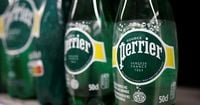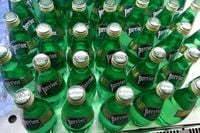New contamination issues at the Perrier plant in Vergèze, Gard, have reignited concerns over the brand's water quality. Recent reports indicate that approximately 300,000 bottles of 75-centilitre Perrier were found to contain pathogenic bacteria (enterobacteria) during an internal inspection on March 11, 2025. This follows a troubling history for the company, as just a year prior, they were forced to destroy three million bottles due to similar contamination issues.
According to Radio France, the parent company, Nestlé Waters, was slow to report these findings to French health authorities, with the contamination being disclosed ten days after it was detected. This delay has raised eyebrows, leading to accusations of negligence and mismanagement. Nestlé acknowledged this “unusually long delay” in their reporting.
The contamination has prompted immediate action, including the shutdown of a production line at the Vergèze facility and the blockage of 369 pallets of bottled water, equating to over 300,000 bottles. Nestlé has stated that the blocked bottles were either due to exceeding the natural flora levels in the water or as a result of technical interventions that caused anomalies. Some of these bottles were later released by the Agence Régionale de Santé (ARS) of Occitanie.
Senator Antoinette Guhl has publicly denounced the situation as a "state scandal," claiming that Nestlé has been protected by high-ranking officials. Guhl, who is part of the inquiry commission on bottled water, expressed her outrage after questioning Nestlé’s director in March 2025, who assured her under oath that the waters were pure. "These revelations today prove that the waters were indeed contaminated and still are... There was clearly perjury at that moment," she stated.
Guhl's criticisms highlight a broader concern about the quality of bottled water in France, emphasizing the need for stricter ecological practices to safeguard water sources. "The pollution we create on the surface eventually affects our groundwater... We urgently need clean ecology and agriculture to guarantee the quality of our water. This is a larger-scale task we must undertake because water quality is undoubtedly the challenge of the coming century," she added.
As the situation unfolds, the prefect of Gard, Jérôme Bonet, is expected to decide soon whether to renew the approval for mineral water production from the Vergèze source. The ARS Occitanie has recommended that production be halted, which could lead to the closure of the Perrier plant and significant job losses, adding to the economic strain already faced by the region.
This predicament is compounded by the recent announcement that the American glassmaker Owens Illinois, located near the Perrier plant, will also be shutting down operations. The potential closure of Perrier would mark a significant blow to the local economy and the brand’s legacy.
In light of these developments, Nestlé Waters has defended its products, stating that the contamination was not from the borehole, and that they are committed to quality management processes that ensure food safety. However, the company has faced backlash for its handling of the situation and the perceived lack of transparency in its operations.
The ongoing investigation into Nestlé's practices has drawn attention to the broader implications of water sourcing and quality standards within the bottled water industry. As scrutiny intensifies, the future of Perrier hangs in the balance, with many questioning whether the brand can recover from this latest scandal.
As of now, the fate of the Vergèze plant remains uncertain, with senators scheduled to meet at the end of April 2025 to discuss the findings of the inquiry commission. A report detailing the commission's findings is expected to be released in May 2025, which could further influence the future of Perrier and its operations.
The challenges faced by Perrier serve as a stark reminder of the importance of accountability and transparency in the food and beverage industry, particularly when it comes to public health and safety. As consumers increasingly demand higher standards and ethical practices, the pressure on companies like Nestlé to adapt and respond effectively will only grow.



